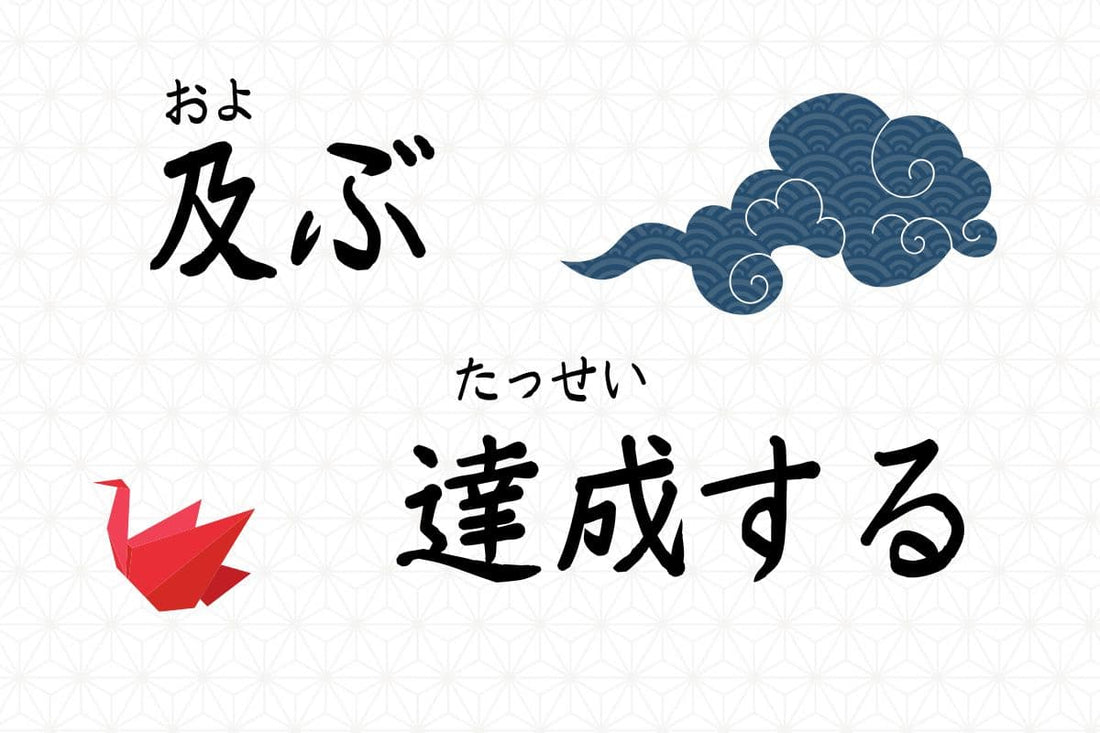
Difference Between 及ぶ (およぶ) and 達成する (たっせいする)
Share
Both 及ぶ and 達成する can relate to "reaching" or "achieving" something, but they have distinct nuances and usage contexts.
1. 及ぶ (およぶ) – "To Extend to / To Reach"
Meaning & Usage
- 及ぶ means "to reach," "to extend to," or "to amount to."
- It is more neutral and broad, often referring to extent, influence, range, or duration.
- 及ぶ is not necessarily about achievement but rather about something naturally reaching a certain point or level.
Examples:
-
彼の影響は世界中に及ぶ。
– "His influence extends worldwide."
(Focus: Range/extent of influence, not an achievement.) -
その被害は全国に及んだ。
– "The damage extended across the entire country."
(Focus: How far the effect reached.) -
手術は5時間に及んだ。
– "The surgery lasted five hours."
(Focus: Duration, not an accomplishment.) -
彼の収入は年収1000万円に及ぶ。
– "His annual income reaches 10 million yen."
(Focus: The level reached, not an accomplishment.)
Key Nuance:
- 及ぶ is neutral and does not imply an intentional achievement.
- It is often used for extent, coverage, or duration rather than goals or accomplishments.
2. 達成する (たっせいする) – "To Achieve / To Accomplish"
Meaning & Usage
- 達成する means "to achieve" or "to accomplish" a specific goal, target, or objective.
- It implies effort, intention, and success.
- It is commonly used in business, personal achievements, and goal-setting contexts.
Examples:
-
彼は目標を達成した。
– "He achieved his goal."
(Focus: A goal was successfully accomplished.) -
売上目標を達成する。
– "To achieve the sales target."
(Focus: Business success and intentional effort.) -
ついに夢を達成した!
– "I finally achieved my dream!"
(Focus: A long-term goal accomplished.) -
プロジェクトは無事に達成された。
– "The project was successfully completed."
(Focus: Successful completion of a planned task.)
Key Nuance:
- 達成する always implies success and effort toward a goal.
- It is commonly used with goals (目標), dreams (夢), and milestones (売上目標, 成績, etc.).
3. Summary of Differences
| Word | Meaning | Key Nuance | Common Usage |
|---|---|---|---|
| 及ぶ (およぶ) | "To reach," "to extend to," "to amount to" | Neutral, describes extent, influence, or duration, not necessarily an achievement | Influence, damage, duration, numbers (影響, 被害, 期間, 収入) |
| 達成する (たっせいする) | "To achieve," "to accomplish" | Implies success and effort, achieving a goal | Goals, business targets, personal achievements (目標, 夢, 売上, 計画) |
4. When to Use Which?
- If something naturally reaches a point or extends in range → Use 及ぶ.
- ✅ 影響が世界中に及ぶ。 (The influence reaches worldwide.)
- ❌ 影響が世界中に達成する (Wrong – influence is not an "achievement.")
- If something is an accomplishment through effort → Use 達成する.
- ✅ 目標を達成する。 (To achieve a goal.)
- ❌ 目標に及ぶ。 (Wrong – goals are achieved, not just "reached.")
5. Example Sentence Comparison
-
彼の年収は1000万円に及ぶ。
– "His annual income reaches 10 million yen." (Just stating the amount, no effort implied.) -
彼は年収1000万円を達成した。
– "He achieved an annual income of 10 million yen." (Implies he worked hard to reach that income.)
6. Conclusion
- 及ぶ is about "reaching" or "extending" naturally (extent, range, or duration).
- 達成する is about achieving something intentionally through effort (goals, dreams, milestones).
If you’re talking about an achievement, use 達成する. If you’re talking about something reaching a level naturally, use 及ぶ!
Related Posts
-
![~に来る – Expressing ‘Come to Do (Something)’ in Japanese [JLPT N5]](//hirakan.com/cdn/shop/articles/ni-kuru-come-to-co.jpg?v=1769937520&width=170)
~に来る – Expressing ‘Come to Do (Something)’ in Japanese [JLPT N5]
Quick Summary Meaning: ~に来る (~にくる) shows that someone comes to a place in order to do something. How to Us...
-
![~に行く – Expressing ‘Go Somewhere to Do Something’ in Japanese [JLPT N5]](//hirakan.com/cdn/shop/articles/ni-iku-go-somewhere-to-do-something.jpg?v=1769937474&width=170)
~に行く – Expressing ‘Go Somewhere to Do Something’ in Japanese [JLPT N5]
Quick Summary Meaning: “Go to do (something).” You move to a place, and your main purpose is to do that action ...
-
![~にあります/~にいます – Saying Where Things and People Are in Japanese [JLPT N5]](//hirakan.com/cdn/shop/articles/ni-arimasu-imasu-location-of-existence.jpg?v=1769251504&width=170)
~にあります/~にいます – Saying Where Things and People Are in Japanese [JLPT N5]
Quick Summary Meaning: ~にあります/~にいます tells you where something or someone “exists” or “is located.” How to ...
-
![~がある・~がいる – Talking About What Exists in Japanese [JLPT N5]](//hirakan.com/cdn/shop/articles/ga-aru-iru-there-is-are.jpg?v=1769251452&width=170)
~がある・~がいる – Talking About What Exists in Japanese [JLPT N5]
Quick Summary Meaning: ~がある and ~がいる mean “there is / there are” or “to exist / to be (somewhere).” ある is for t...
-
![~すぎる – Saying Something Is “Too Much” in Japanese [JLPT N5]](//hirakan.com/cdn/shop/articles/sugiru-too-much.jpg?v=1769251408&width=170)
~すぎる – Saying Something Is “Too Much” in Japanese [JLPT N5]
Quick Summary Meaning: ~すぎる (~sugiru) means “too much” or “excessive.” It shows that something goes beyond a no...
-
![~く/~になる/~くする – Expressing Change with Adjectives in Japanese [JLPT N5]](//hirakan.com/cdn/shop/articles/ku-naru-suru-expressing-change.jpg?v=1769251371&width=170)
~く/~になる/~くする – Expressing Change with Adjectives in Japanese [JLPT N5]
Quick Summary Meaning: ~く/~になる/~くする lets you talk about how things change in state: “become ~,” “get ~,” or “make som...
-
![な形容詞 (Na-adjectives) – Basic Forms with です in Japanese [JLPT N5]](//hirakan.com/cdn/shop/articles/na-keiyoushi-basic-desu-forms.jpg?v=1769251316&width=170)
な形容詞 (Na-adjectives) – Basic Forms with です in Japanese [JLPT N5]
Quick Summary Meaning: な形容詞 (na-adjectives) are adjectives that describe what something or someone is like, sim...
-
![イ形容詞 – Basic i-Adjective Conjugations in Japanese [JLPT N5]](//hirakan.com/cdn/shop/articles/i-adjectives.jpg?v=1769251251&width=170)
イ形容詞 – Basic i-Adjective Conjugations in Japanese [JLPT N5]
Quick Summary Meaning: イ形容詞 (i-adjectives) are adjectives that end in い and describe how something is, like “big,” “q...
-
![~ます – Polite Present and Past Verb Forms in Japanese [JLPT N5]](//hirakan.com/cdn/shop/articles/masu_-_polite_verb_form.jpg?v=1767433709&width=170)
~ます – Polite Present and Past Verb Forms in Japanese [JLPT N5]
Quick Summary Meaning: The endings ~ます/~ません/~ました/~ませんでした make verbs polite in Japanese (present/future and past...
-
![よ – Adding Friendly Emphasis in Japanese [JLPT N5]](//hirakan.com/cdn/shop/articles/yo_-_ending_particle_Friendly_Emphasis.jpg?v=1767433517&width=170)
よ – Adding Friendly Emphasis in Japanese [JLPT N5]
Quick Summary Meaning: The sentence-ending particle よ adds light emphasis. It shows new information, your strong opin...
-
![ね – Softly Seeking Agreement in Japanese [JLPT N5]](//hirakan.com/cdn/shop/articles/ending_particle.jpg?v=1766907843&width=170)
ね – Softly Seeking Agreement in Japanese [JLPT N5]
Quick Summary Meaning: The particle ね is used at the end of a sentence to gently seek agreement, confirmation, ...
-
![何・だれ・いつ・どこ・どう – Basic Question Words in Japanese [JLPT N5]](//hirakan.com/cdn/shop/articles/Question_Words.jpg?v=1766907708&width=170)
何・だれ・いつ・どこ・どう – Basic Question Words in Japanese [JLPT N5]
Quick Summary Meaning: These are basic Japanese “wh-words” like “what, who, when, where, how, why, how much, ho...
-
![ここ・そこ・あそこ・どこ – Talking About Places in Japanese [JLPT N5]](//hirakan.com/cdn/shop/articles/places_fb57172a-7d06-47ee-a9b7-c1f4b6b2b264.jpg?v=1766305419&width=170)
ここ・そこ・あそこ・どこ – Talking About Places in Japanese [JLPT N5]
Quick Summary Meaning: ここ (koko) = here, そこ (soko) = there (near you), あそこ (asoko) = over there (far from both)...
-
![この・その・あの・どの – Using ‘This / That / Which’ with Nouns in Japanese [JLPT N5]](//hirakan.com/cdn/shop/articles/acd351ada3fe4b04ae86de788a3350b8.jpg?v=1766305268&width=170)
この・その・あの・どの – Using ‘This / That / Which’ with Nouns in Japanese [JLPT N5]
Quick Summary Meaning: この (kono), その (sono), あの (ano), どの (dono) mean “this / that / which” when they come dire...
-
![これ・それ・あれ・どれ – Saying ‘This / That / Which One’ in Japanese [JLPT N5]](//hirakan.com/cdn/shop/articles/this-that.jpg?v=1766305107&width=170)
これ・それ・あれ・どれ – Saying ‘This / That / Which One’ in Japanese [JLPT N5]
Quick Summary Meaning: これ (kore), それ (sore), あれ (are), and どれ (dore) all mean “this / that / which (one)” when you ar...
-
![か~か – Expressing Choices like “A or B” in Japanese [JLPT N5]](//hirakan.com/cdn/shop/articles/choices.jpg?v=1766304827&width=170)
か~か – Expressing Choices like “A or B” in Japanese [JLPT N5]
Quick Summary Meaning: The pattern か~か shows a simple choice: “A or B.” How to Use: Put か after each optio...
-
![~から~まで – Saying “From A to B” in Japanese [JLPT N5]](//hirakan.com/cdn/shop/articles/from-AtoB.jpg?v=1765093560&width=170)
~から~まで – Saying “From A to B” in Japanese [JLPT N5]
Quick Summary Meaning: ~から~まで shows the starting point and ending point of something: “from A to B.” It is ofte...
-
![まで – Expressing “Until” and “Up To” in Japanese [JLPT N5]](//hirakan.com/cdn/shop/articles/until-up-to.jpg?v=1765093405&width=170)
まで – Expressing “Until” and “Up To” in Japanese [JLPT N5]
Quick Summary Meaning: まで (made) means “until” or “up to” and shows a limit of time, place, number, or even act...
-
![から – Expressing “Because” and “From/Since” in Japanese [JLPT N5]](//hirakan.com/cdn/shop/articles/because-from_since.jpg?v=1765093285&width=170)
から – Expressing “Because” and “From/Since” in Japanese [JLPT N5]
Quick Summary Meaning: から shows a reason (“because”) or a starting point (“from / since”). How to Use: Put...
-
![や – Listing Examples with “And, Among Others” in Japanese [JLPT N5]](//hirakan.com/cdn/shop/articles/and.jpg?v=1765093138&width=170)
や – Listing Examples with “And, Among Others” in Japanese [JLPT N5]
Quick Summary Meaning: や connects two or more nouns and means “and” or “among other things.” It shows that your lis...
-
![か – Forming Questions and Saying “Or” in Japanese [JLPT N5]](//hirakan.com/cdn/shop/articles/ka-questions.jpg?v=1763787134&width=170)
か – Forming Questions and Saying “Or” in Japanese [JLPT N5]
Quick Summary Meaning: The particle か turns a sentence into a question, or can mean “or” when choosing between thin...
-
![も – Saying “Also” and “Too” in Japanese [JLPT N5]](//hirakan.com/cdn/shop/articles/mo-also-too_99f908e6-78d0-4f82-8319-391ef42764bc.jpg?v=1763787251&width=170)
も – Saying “Also” and “Too” in Japanese [JLPT N5]
Quick Summary Meaning: The particle も means “also,” “too,” or “even.” It shows that something is the same as someth...
-
![と – Linking 'And', 'With', and Quotations in Japanese [JLPT N5]](//hirakan.com/cdn/shop/articles/to-and-with-quotation.jpg?v=1763265110&width=170)
と – Linking 'And', 'With', and Quotations in Japanese [JLPT N5]
Quick Summary Meaning: と links things like “A and B,” marks doing something with someone, and shows a quotation (“…,”...
-
![で – Marking Where and How an Action Happens in Japanese [JLPT N5]](//hirakan.com/cdn/shop/articles/de-where-how-action-happens.jpg?v=1763264973&width=170)
で – Marking Where and How an Action Happens in Japanese [JLPT N5]
Quick Summary Meaning: で marks the location where an action happens or the means/tool/method used to do something...
-
![へ – Marking Direction ‘Toward’ in Japanese [JLPT N5]](//hirakan.com/cdn/shop/articles/he-marking-direction.jpg?v=1762667986&width=170)
へ – Marking Direction ‘Toward’ in Japanese [JLPT N5]
Quick Summary Meaning: The particle へ marks direction or “toward” a place or person. It points where something is hea...
-
![に – Marking Time, Destinations, and Recipients in Japanese [JLPT N5]](//hirakan.com/cdn/shop/articles/ni-marking-destination.jpg?v=1762667846&width=170)
に – Marking Time, Destinations, and Recipients in Japanese [JLPT N5]
Quick Summary Meaning: The particle に marks a point in time (at/on), a destination you reach (to/into), or a target/r...
-
![の – Possession and Noun Linking in Japanese [JLPT N5]](//hirakan.com/cdn/shop/articles/no-possession-and-noun-linking.jpg?v=1761961297&width=170)
の – Possession and Noun Linking in Japanese [JLPT N5]
Quick Summary Meaning: Links two nouns to show possession, belonging, or description. Often reads as “’s” or “of....
-
![を – Marking the Direct Object in Japanese [JLPT N5]](//hirakan.com/cdn/shop/articles/o-direct-object.jpg?v=1761960990&width=170)
を – Marking the Direct Object in Japanese [JLPT N5]
Quick Summary Meaning: を marks the direct object — the thing that receives the action of a verb. It’s pronounced ...
-
![が – Marking the Subject ('Who/What') in Japanese [JLPT N5]](//hirakan.com/cdn/shop/articles/ga-subject-marker_60f30f70-6ca5-47ee-9a00-3646195d7d3c.jpg?v=1761386355&width=170)
が – Marking the Subject ('Who/What') in Japanese [JLPT N5]
Quick Summary Meaning: The particle が marks the subject of a sentence and highlights new or focused information (an...
-
![は (wa) – Topic Marker and Contrast in Japanese [JLPT N5]](//hirakan.com/cdn/shop/articles/wa-topic-marker.jpg?v=1761385996&width=170)
は (wa) – Topic Marker and Contrast in Japanese [JLPT N5]
Quick Summary Meaning: Marks the topic of the sentence — what you’re talking about. Often feels like “as for...” in E...
-
![じゃない・ではありません – Expressing 'Is/Was Not' in Japanese [JLPT N5]](//hirakan.com/cdn/shop/articles/janai-dehaarimasen_2594963b-531e-4f4d-a9b0-361010e0a720.jpg?v=1760865884&width=170)
じゃない・ではありません – Expressing 'Is/Was Not' in Japanese [JLPT N5]
Quick Summary Meaning: The negative of the copula “to be.” Say “is not” or “was not” with nouns and na-adjectives. Ho...
-
![だ・です/だった・でした – Saying ‘to be’ in Japanese [JLPT N5]](//hirakan.com/cdn/shop/articles/da-desu-datta-deshita_58bbc732-53fd-48da-83c7-4e477e7cc0b2.jpg?v=1760864506&width=170)
だ・です/だった・でした – Saying ‘to be’ in Japanese [JLPT N5]
Quick Summary Meaning: The Japanese copula — the basic “to be.” It links a topic to a noun or a na-adjective to state...
-

Common Japanese Onomatopoeia: Essential Words You’ll Hear Everywhere
If you spend any time in Japan, you’ll hear onomatopoeia everywhere: on TV, in everyday conversations, in manga, and ...
-

How to Say “To Increase” and “To Decrease” in Japanese: With Examples
You've noticed there are multiple ways to say “to increase” or "to decrease" in Japanese. Between transitive and intr...
-

How to Say "Police Officer" in Japanese: Common Terms and Slang
There are several ways to say "police officer" in Japanese, and each one has a different level of formality and usage...
-

Understanding だ (da) and です (desu) in Japanese: Meaning and Usage
When learning Japanese, one of the first things you’ll come across is だ (da) and です (desu). These words don’t have a ...
-

JLPT N5 Study Guide: A Beginner's Roadmap to Acing the Test
If you’ve just started learning Japanese and are aiming to ace the JLPT N5, yo...
-

Beginner's Guide to Japanese Particles: Learn the Basics
TL;DR: Japanese particles are crucial for structuring sentences, acting like conjunctions or prepositions in English...
-

JLPT N5 Vocabulary List - All 748 Words You Need to Know
Vocabulary is the foundation of any language, and Japanese is no exception. The more you know, the better. Over time ...
-
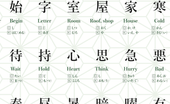
JLPT N4 Kanij List - All 176 Characters You Need To Know
After mastering the JLPT N5 kanji, you're ready to take your Japanese kanji game to the next level. JLPT N4. Let's go...
-
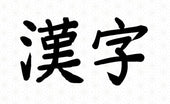
Kanji For Kanji - 漢字
Inception time. Which kanji compose the kanji of "kanji"? The kanji for "kanji" is actually pretty straightforward. I...
-

How to Memorize Katakana Easily: 9 Tips for Beginners
For those diving into Japanese, mastering hiragana and katakana is the first significant challenge. While hiragana o...
-
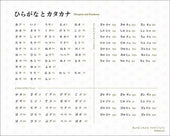
Complete Hiragana and Katakana Chart With All 112 Characters
The very first step for everybody who wants to learn Japanese is to study the hiragana and katakana chart (before lea...
-
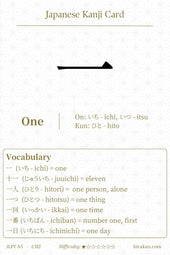
JLPT N5 Kanji: Kanji For One 一 (ichi)
Probably one the most simple kanji to remember, the kanji for 'one' is simply written '一'. Let's see its readings and...
-

How Long Does It Take to Learn Kanji? A Beginner's Guide
Ask any Japanese student what's the scariest part of learning the language, and they'll say kanji. And they're righ...
-
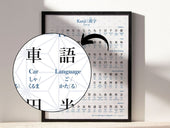
Is it Necessary to Learn Kanji? The Last Answer You'll Ever Need
Many beginners in Japanese wonder whether they should really learn kanji. I know this, because I also wondered when s...
-

How Long Does it Take to Learn Hiragana and Katakana?
As a beginner in Japanese, your first step is diving into the alphabets of Hiragana and Katakana. These are the build...
-

13 Best YouTube Channels to Learn Japanese, From Beginner to Intermediate
YouTube can be an incredible resource for learning Japanese. And best of all, it's free. So we've compiled a list of ...
-

Top 10 Manga for Japanese Language Learners: From Beginners to Intermediates!
If you're learning Japanese, chances are you're interested in manga. So instead of reading texts about Tanaka-san s...
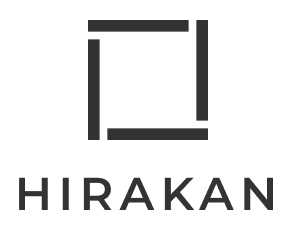
![~に来る – Expressing ‘Come to Do (Something)’ in Japanese [JLPT N5]](http://hirakan.com/cdn/shop/articles/ni-kuru-come-to-co.jpg?v=1769937520&width=170)
![~に行く – Expressing ‘Go Somewhere to Do Something’ in Japanese [JLPT N5]](http://hirakan.com/cdn/shop/articles/ni-iku-go-somewhere-to-do-something.jpg?v=1769937474&width=170)
![~にあります/~にいます – Saying Where Things and People Are in Japanese [JLPT N5]](http://hirakan.com/cdn/shop/articles/ni-arimasu-imasu-location-of-existence.jpg?v=1769251504&width=170)
![~がある・~がいる – Talking About What Exists in Japanese [JLPT N5]](http://hirakan.com/cdn/shop/articles/ga-aru-iru-there-is-are.jpg?v=1769251452&width=170)
![~すぎる – Saying Something Is “Too Much” in Japanese [JLPT N5]](http://hirakan.com/cdn/shop/articles/sugiru-too-much.jpg?v=1769251408&width=170)
![~く/~になる/~くする – Expressing Change with Adjectives in Japanese [JLPT N5]](http://hirakan.com/cdn/shop/articles/ku-naru-suru-expressing-change.jpg?v=1769251371&width=170)
![な形容詞 (Na-adjectives) – Basic Forms with です in Japanese [JLPT N5]](http://hirakan.com/cdn/shop/articles/na-keiyoushi-basic-desu-forms.jpg?v=1769251316&width=170)
![イ形容詞 – Basic i-Adjective Conjugations in Japanese [JLPT N5]](http://hirakan.com/cdn/shop/articles/i-adjectives.jpg?v=1769251251&width=170)
![~ます – Polite Present and Past Verb Forms in Japanese [JLPT N5]](http://hirakan.com/cdn/shop/articles/masu_-_polite_verb_form.jpg?v=1767433709&width=170)
![よ – Adding Friendly Emphasis in Japanese [JLPT N5]](http://hirakan.com/cdn/shop/articles/yo_-_ending_particle_Friendly_Emphasis.jpg?v=1767433517&width=170)
![ね – Softly Seeking Agreement in Japanese [JLPT N5]](http://hirakan.com/cdn/shop/articles/ending_particle.jpg?v=1766907843&width=170)
![何・だれ・いつ・どこ・どう – Basic Question Words in Japanese [JLPT N5]](http://hirakan.com/cdn/shop/articles/Question_Words.jpg?v=1766907708&width=170)
![ここ・そこ・あそこ・どこ – Talking About Places in Japanese [JLPT N5]](http://hirakan.com/cdn/shop/articles/places_fb57172a-7d06-47ee-a9b7-c1f4b6b2b264.jpg?v=1766305419&width=170)
![この・その・あの・どの – Using ‘This / That / Which’ with Nouns in Japanese [JLPT N5]](http://hirakan.com/cdn/shop/articles/acd351ada3fe4b04ae86de788a3350b8.jpg?v=1766305268&width=170)
![これ・それ・あれ・どれ – Saying ‘This / That / Which One’ in Japanese [JLPT N5]](http://hirakan.com/cdn/shop/articles/this-that.jpg?v=1766305107&width=170)
![か~か – Expressing Choices like “A or B” in Japanese [JLPT N5]](http://hirakan.com/cdn/shop/articles/choices.jpg?v=1766304827&width=170)
![~から~まで – Saying “From A to B” in Japanese [JLPT N5]](http://hirakan.com/cdn/shop/articles/from-AtoB.jpg?v=1765093560&width=170)
![まで – Expressing “Until” and “Up To” in Japanese [JLPT N5]](http://hirakan.com/cdn/shop/articles/until-up-to.jpg?v=1765093405&width=170)
![から – Expressing “Because” and “From/Since” in Japanese [JLPT N5]](http://hirakan.com/cdn/shop/articles/because-from_since.jpg?v=1765093285&width=170)
![や – Listing Examples with “And, Among Others” in Japanese [JLPT N5]](http://hirakan.com/cdn/shop/articles/and.jpg?v=1765093138&width=170)
![か – Forming Questions and Saying “Or” in Japanese [JLPT N5]](http://hirakan.com/cdn/shop/articles/ka-questions.jpg?v=1763787134&width=170)
![も – Saying “Also” and “Too” in Japanese [JLPT N5]](http://hirakan.com/cdn/shop/articles/mo-also-too_99f908e6-78d0-4f82-8319-391ef42764bc.jpg?v=1763787251&width=170)
![と – Linking 'And', 'With', and Quotations in Japanese [JLPT N5]](http://hirakan.com/cdn/shop/articles/to-and-with-quotation.jpg?v=1763265110&width=170)
![で – Marking Where and How an Action Happens in Japanese [JLPT N5]](http://hirakan.com/cdn/shop/articles/de-where-how-action-happens.jpg?v=1763264973&width=170)
![へ – Marking Direction ‘Toward’ in Japanese [JLPT N5]](http://hirakan.com/cdn/shop/articles/he-marking-direction.jpg?v=1762667986&width=170)
![に – Marking Time, Destinations, and Recipients in Japanese [JLPT N5]](http://hirakan.com/cdn/shop/articles/ni-marking-destination.jpg?v=1762667846&width=170)
![の – Possession and Noun Linking in Japanese [JLPT N5]](http://hirakan.com/cdn/shop/articles/no-possession-and-noun-linking.jpg?v=1761961297&width=170)
![を – Marking the Direct Object in Japanese [JLPT N5]](http://hirakan.com/cdn/shop/articles/o-direct-object.jpg?v=1761960990&width=170)
![が – Marking the Subject ('Who/What') in Japanese [JLPT N5]](http://hirakan.com/cdn/shop/articles/ga-subject-marker_60f30f70-6ca5-47ee-9a00-3646195d7d3c.jpg?v=1761386355&width=170)
![は (wa) – Topic Marker and Contrast in Japanese [JLPT N5]](http://hirakan.com/cdn/shop/articles/wa-topic-marker.jpg?v=1761385996&width=170)
![じゃない・ではありません – Expressing 'Is/Was Not' in Japanese [JLPT N5]](http://hirakan.com/cdn/shop/articles/janai-dehaarimasen_2594963b-531e-4f4d-a9b0-361010e0a720.jpg?v=1760865884&width=170)
![だ・です/だった・でした – Saying ‘to be’ in Japanese [JLPT N5]](http://hirakan.com/cdn/shop/articles/da-desu-datta-deshita_58bbc732-53fd-48da-83c7-4e477e7cc0b2.jpg?v=1760864506&width=170)
















